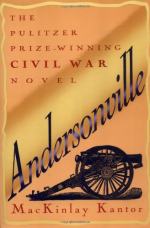One day I saw “Dick Allen’s Raiders,” eleven in number, attack a man wearing the uniform of Ellett’s Marine Brigade. He was a recent comer, and alone, but he was brave. He had come into possession of a spade, by some means or another, and he used this with delightful vigor and effect. Two or three times he struck one of his assailants so fairly on the head and with such good will that I congratulated myself that he had killed him. Finally, Dick Allen managed to slip around behind him unnoticed, and striking him on the head with a slung-shot, knocked him down, when the whole crowd pounced upon him to kill him, but were driven off by others rallying to his assistance.
The proceeds of these forays enabled the Raiders to wax fat and lusty, while others were dying from starvation. They all had good tents, constructed of stolen blankets, and their headquarters was a large, roomy tent, with a circular top, situated on the street leading to the South Gate, and capable of accommodating from seventy-five to one hundred men. All the material for this had been wrested away from others. While hundreds were dying of scurvy and diarrhea, from the miserable, insufficient food, and lack of vegetables, these fellows had flour, fresh meat, onions, potatoes, green beans, and other things, the very looks of which were a torture to hungry, scorbutic, dysenteric men. They were on the best possible terms with the Rebels, whom they fawned upon and groveled before, and were in return allowed many favors, in the way of trading, going out upon detail, and making purchases.
Among their special objects of attack were the small traders in the prison. We had quite a number of these whose genius for barter was so strong that it took root and flourished even in that unpropitious soil, and during the time when new prisoners were constantly coming in with money, they managed to accumulate small sums—from ten dollars upward, by trading between the guards and the prisoners. In the period immediately following a prisoner’s entrance he was likely to spend all his money and trade off all his possessions for food, trusting to fortune to get him out of there when these were gone. Then was when he was profitable to these go-betweens, who managed to make him pay handsomely for what he got. The Raiders kept watch of these traders, and plundered them whenever occasion served. It reminded one of the habits of the fishing eagle, which hovers around until some other bird catches a fish, and then takes it away.
CHAPTER XXXV.
A community without government—formation of the regulators—raiders attack Key but are bluffed off—assault of the regulators on the raiders —desperate battle—overthrow of the raiders.




